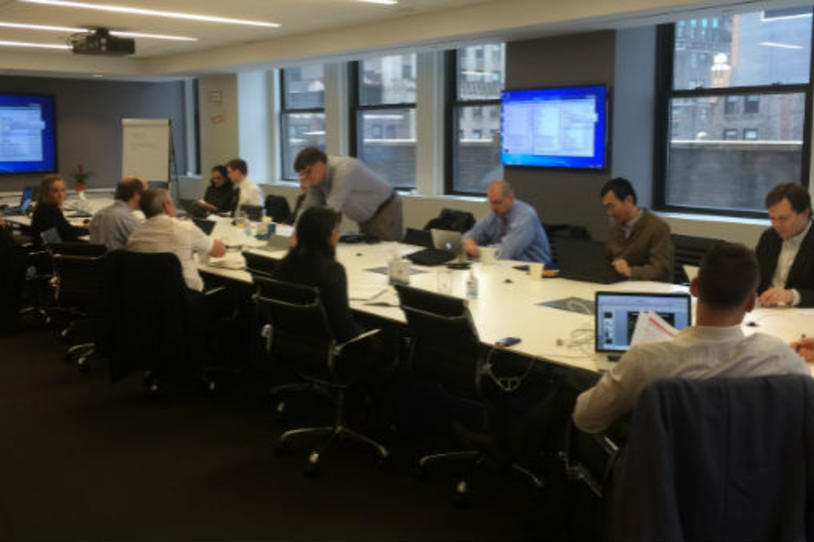
Grantees gather this morning for an assessment meeting in the Edmond J. Safra Conference Room at our offices in New York.
The participants gather in the large conference room. Coffee, juice, plates of fruit and the requisite New York bagels form an inviting line along a credenza. A skyline view of pre-war office buildings competes with two presentation screens until someone presses a switch and the window blinds come purring down.
There is no assigned seating. There are no rules against dialogue with other presenters or assessors. The only request is to keep the talks and Q&A sessions within the allotted time frame.
Welcome to a Michael J. Fox Foundation Awardee Meeting, where funding recipients’ work is reviewed. There are more to these meetings than a simple assessment, though.
“We need to understand what our scientists are doing, what they consider the biggest challenges in the field, what tools and resources they need,” says Brian Fiske, PhD, vice president of research programs. “So a fundamental part of our strategy is not just about getting people money but helping them to develop their research.”
Dr. Fiske and his colleagues realized that meetings with multiple awardees afforded a remarkable opportunity: brainstorming. Injecting collective, no-judgment discussions into the proceedings could initiate “a unique intellectual pursuit in finding a cure for Parkinson’s,” he says. “There’s tremendous value in a roomful of smart people who can help us understand the landscape.”
Associate Director Terina Martinez, PhD, agrees. “We’re not merely assessing their projects,” she says. “Our awardee meetings are tangible demonstrations of how we view our scientists as partners. We offer an open sharing of ideas with the purpose of benefitting the greater community.”
In the MJFF conference room, the first awardee presents her findings with vibrant graphics. Her team may have identified a potential pathway. A surge of questions.
“‘How do you interpret this finding in terms of the paper that so-and-so published last week?’ Or ‘Your observation explains my recent data’ – that happens a lot,” says Dr. Martinez. “There’s a tremendous amount of sharing and resource gathering. And we not only get the latest and greatest in research, but closure of the resources we’ve invested in. It’s such an elegant approach.”
A break is called. The participants erupt into lively chatter, piling plates with luncheon offerings. This is when, Dr. Fiske says, “collaborations can be established. We’ve had examples of two investigators meeting at one of our assessments and later submit a proposal together for a new grant. We’ve also brought back researchers for workshops and online webinars identifying problems and ideas that they have raised during our discussions.”
More findings, more questions and more coffee until adjournment cues a chorus of clacks as scientists pull up the handles of their carry-ons and wheel them out the door — chatting, chuckling and entering contact information in smart phones.
They’ll receive feedback in a few days from the MJFF staff. Most awardees will continue to work with the Foundation in some way. Some will receive funding extensions. For all, the work toward finding a cure for Parkinson’s marches forward.
“There’s something to be said about face time,” says Dr. Fiske. “Not all grant-making agencies do this regularly. You need to be able to talk to your scientists so you can know who they are. If you don’t have that connection, you’re just funding.”